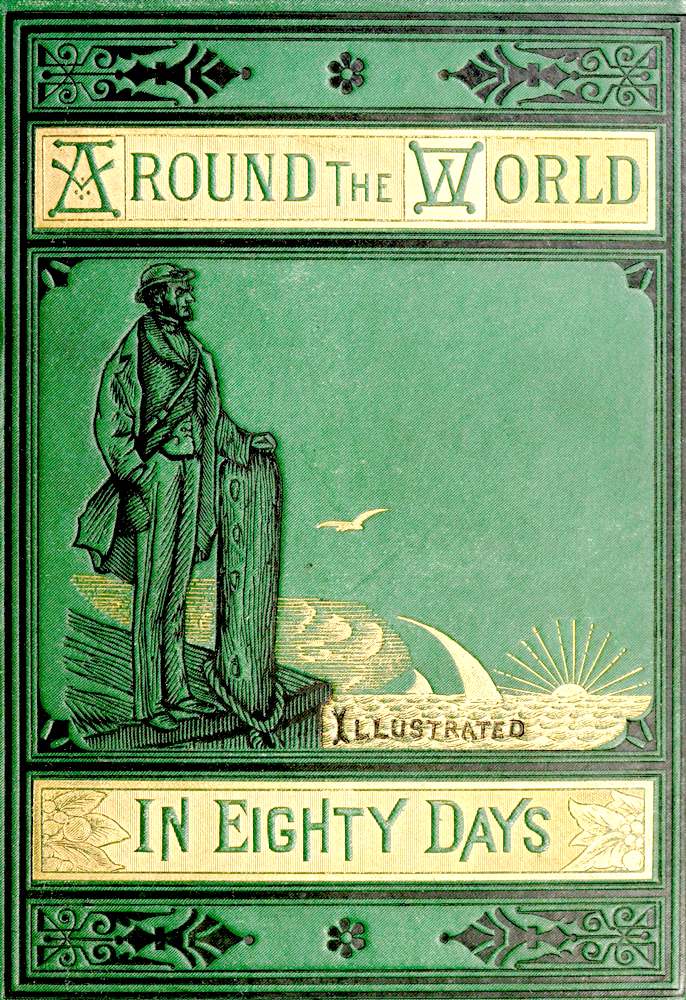|
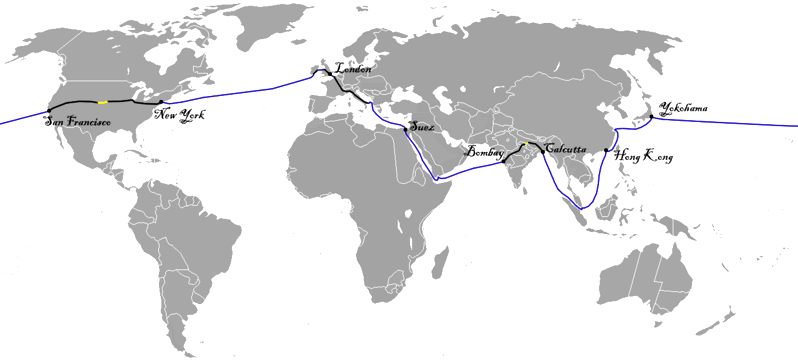
Map
of the route taken by Phileas Fogg, starting in London, then proceeding
east to Suez, Bombay, Calcutta, Hong Kong , Yokohama, San Francisco, New
York, and across the Atlantic
ocean to Ireland, then Liverpool England, and back to London. The route
planner below is for a circumnavigation on water in under 80 days, using
hydrogen, as per the author's prediction in The Mysterious Island. It
would be a major achievement if this was arranged to honor the 150th
anniversary of his publication.
<<<<
CHAPTER XXVII.
IN WHICH PASSEPARTOUT UNDERGOES, AT A SPEED OF TWENTY MILES AN HOUR, A COURSE OF MORMON HISTORY
The train, on leaving Great Salt Lake at Ogden, passed northward for an hour as far as Weber River, having completed nearly nine hundred miles from San Francisco. From this point it took an easterly direction towards the jagged Wahsatch Mountains. It was in the section included between this range and the Rocky Mountains that the American engineers found the most formidable difficulties in laying the road, and that the government granted a subsidy of forty-eight thousand dollars per mile, instead of sixteen thousand allowed for the work done on the plains. But the engineers, instead of violating nature, avoided its difficulties by winding around, instead of penetrating the rocks. One tunnel only, fourteen thousand feet in length, was pierced in order to arrive at the great basin.
The track up to this time had reached its highest elevation at the Great Salt Lake. From this point it described a long curve, descending towards Bitter Creek Valley, to rise again to the dividing ridge of the waters between the Atlantic and the Pacific. There were many creeks in this mountainous region, and it was necessary to cross Muddy Creek, Green Creek, and others, upon culverts.
Passepartout grew more and more impatient as they went on, while Fix longed to get out of this difficult region, and was more anxious than Phileas Fogg himself to be beyond the danger of delays and accidents, and set foot on English soil.
At ten o’clock at night the train stopped at Fort Bridger station, and twenty minutes later entered Wyoming Territory, following the valley of Bitter Creek throughout. The next day, 7th December, they stopped for a quarter of an hour at Green River station. Snow had fallen abundantly during the night, but, being mixed with rain, it had half melted, and did not interrupt their progress. The bad weather, however, annoyed Passepartout; for the accumulation of snow, by blocking the wheels of the cars, would certainly have been fatal to Mr. Fogg’s tour.
“What an idea!” he said to himself. “Why did my master make this journey in winter? Couldn’t he have waited for the good season to increase his chances?”
While the worthy Frenchman was absorbed in the state of the sky and the depression of the temperature, Aouda was experiencing fears from a totally different cause.
Several passengers had got off at Green River, and were walking up and down the platforms; and among these Aouda recognised Colonel Stamp Proctor, the same who had so grossly insulted Phileas Fogg at the San Francisco meeting. Not wishing to be recognised, the young woman drew back from the window, feeling much alarm at her discovery. She was attached to the man who, however coldly, gave her daily evidences of the most absolute devotion. She did not comprehend, perhaps, the depth of the sentiment with which her protector inspired her, which she called gratitude, but which, though she was unconscious of it, was really more than that. Her heart sank within her when she recognised the man whom Mr. Fogg desired, sooner or later, to call to account for his conduct. Chance alone, it was clear, had brought Colonel Proctor on this train; but there he was, and it was necessary, at all hazards, that Phileas Fogg should not perceive his adversary.
Aouda seized a moment when Mr. Fogg was asleep to tell Fix and Passepartout whom she had seen.
“That Proctor on this train!” cried Fix. “Well, reassure yourself, madam; before he settles with Mr. Fogg; he has got to deal with me! It seems to me that I was the more insulted of the two.”
“And, besides,” added Passepartout, “I’ll take charge of him, colonel as he is.”
“Mr. Fix,” resumed Aouda, “Mr. Fogg will allow no one to avenge him. He said that he would come back to America to find this man. Should he perceive Colonel Proctor, we could not prevent a collision which might have terrible results. He must not see him.”
“You are right, madam,” replied Fix; “a meeting between them might ruin all. Whether he were victorious or beaten, Mr. Fogg would be delayed, and—”
“And,” added Passepartout, “that would play the game of the gentlemen of the Reform Club. In four days we shall be in New York. Well, if my master does not leave this car during those four days, we may hope that chance will not bring him face to face with this confounded American. We must, if possible, prevent his stirring out of it.”
The conversation dropped. Mr. Fogg had just woken up, and was looking out of the window. Soon after Passepartout, without being heard by his master or Aouda, whispered to the detective, “Would you really fight for him?”
“I would do anything,” replied Fix, in a tone which betrayed determined will, “to get him back living to Europe!”
Passepartout felt something like a shudder shoot through his frame, but his confidence in his master remained unbroken.
Was there any means of detaining Mr. Fogg in the car, to avoid a meeting between him and the colonel? It ought not to be a difficult task, since that gentleman was naturally sedentary and little curious. The detective, at least, seemed to have found a way; for, after a few moments, he said to Mr. Fogg, “These are long and slow hours, sir, that we are passing on the railway.”
“Yes,” replied Mr. Fogg; “but they pass.”
“You were in the habit of playing whist,” resumed Fix, “on the steamers.”
“Yes; but it would be difficult to do so here. I have neither cards nor partners.”
“Oh, but we can easily buy some cards, for they are sold on all the American trains. And as for partners, if madam plays —”
“Certainly, sir,” Aouda quickly replied; “I understand whist. It is part of an English education.”
“I myself have some pretensions to playing a good game. Well, here are three of us, and a dummy —”
“As you please, sir,” replied Phileas Fogg, heartily glad to resume his favourite pastime even on the railway.
Passepartout was dispatched in search of the steward, and soon returned with two packs of cards, some pins, counters, and a shelf covered with cloth.
The game commenced. Aouda understood whist sufficiently well, and even received some compliments on her playing from Mr. Fogg. As for the detective, he was simply an adept, and worthy of being matched against his present opponent.
“Now,” thought Passepartout, “we’ve got him. He won’t budge.”
At eleven in the morning the train had reached the dividing ridge of the waters at Bridger Pass, seven thousand five hundred and twenty-four feet above the level of the sea, one of the highest points attained by the track in crossing the Rocky Mountains. After going about two hundred miles, the travellers at last found themselves on one of those vast plains which extend to the Atlantic, and which nature has made so propitious for laying the iron road.
On the declivity of the Atlantic basin the first streams, branches of the North Platte River, already appeared. The whole northern and eastern horizon was bounded by the immense semi-circular curtain which is formed by the southern portion of the Rocky Mountains, the highest being Laramie Peak. Between this and the railway extended vast plains, plentifully irrigated. On the right rose the lower spurs of the mountainous mass which extends southward to the sources of the Arkansas River, one of the great tributaries of the Missouri.
At half-past twelve the travellers caught sight for an instant of Fort Halleck, which commands that section; and in a few more hours the Rocky Mountains were crossed. There was reason to hope, then, that no accident would mark the journey through this difficult country. The snow had ceased falling, and the air became crisp and cold. Large birds, frightened by the locomotive, rose and flew off in the distance. No wild beast appeared on the plain. It was a desert in its vast nakedness.
After a comfortable breakfast, served in the car, Mr. Fogg and his partners had just resumed whist, when a violent whistling was heard, and the train stopped. Passepartout put his head out of the door, but saw nothing to cause the delay; no station was in view.
Aouda and Fix feared that Mr. Fogg might take it into his head to get out; but that gentleman contented himself with saying to his servant, “See what is the matter.”
Passepartout rushed out of the car. Thirty or forty passengers had already descended, amongst them Colonel Stamp Proctor.
The train had stopped before a red signal which blocked the way. The engineer and conductor were talking excitedly with a signal-man, whom the station-master at Medicine Bow, the next stopping place, had sent on before. The passengers drew around and took part in the discussion, in which Colonel Proctor, with his insolent manner, was conspicuous.
Passepartout, joining the group, heard the signal-man say, “No! you can’t pass. The bridge at Medicine Bow is shaky, and would not bear the weight of the train.”
This was a suspension-bridge thrown over some rapids, about a mile from the place where they now were. According to the signal-man, it was in a ruinous condition, several of the iron wires being broken; and it was impossible to risk the passage. He did not in any way exaggerate the condition of the bridge. It may be taken for granted that, rash as the Americans usually are, when they are prudent there is good reason for it.
Passepartout, not daring to apprise his master of what he heard, listened with set teeth, immovable as a statue.
“Hum!” cried Colonel Proctor; “but we are not going to stay here, I imagine, and take root in the snow?”
“Colonel,” replied the conductor, “we have telegraphed to Omaha for a train, but it is not likely that it will reach Medicine Bow in less than six hours.”
“Six hours!” cried Passepartout.
“Certainly,” returned the conductor, “besides, it will take us as long as that to reach Medicine Bow on foot.”
“But it is only a mile from here,” said one of the passengers.
“Yes, but it’s on the other side of the river.”
“And can’t we cross that in a boat?” asked the colonel.
“That’s impossible. The creek is swelled by the rains. It is a rapid, and we shall have to make a circuit of ten miles to the north to find a ford.”
The colonel launched a volley of oaths, denouncing the railway company and the conductor; and Passepartout, who was furious, was not disinclined to make common cause with him. Here was an obstacle, indeed, which all his master’s banknotes could not remove.
There was a general disappointment among the passengers, who, without reckoning the delay, saw themselves compelled to trudge fifteen miles over a plain covered with snow. They grumbled and protested, and would certainly have thus attracted Phileas Fogg’s attention if he had not been completely absorbed in his game.
Passepartout found that he could not avoid telling his master what had occurred, and, with hanging head, he was turning towards the car, when the engineer, a true Yankee, named Forster called out, “Gentlemen, perhaps there is a way, after all, to get over.”
“On the bridge?” asked a passenger.
“On the bridge.”
“With our train?”
“With our train.”
Passepartout stopped short, and eagerly listened to the engineer.
“But the bridge is unsafe,” urged the conductor.
“No matter,” replied Forster; “I think that by putting on the very highest speed we might have a chance of getting over.”
“The devil!” muttered Passepartout.
But a number of the passengers were at once attracted by the engineer’s proposal, and Colonel Proctor was especially delighted, and found the plan a very feasible one. He told stories about engineers leaping their trains over rivers without bridges, by putting on full steam; and many of those present avowed themselves of the engineer’s mind.
“We have fifty chances out of a hundred of getting over,” said one.
“Eighty! ninety!”
Passepartout was astounded, and, though ready to attempt anything to get over Medicine Creek, thought the experiment proposed a little too American. “Besides,” thought he, “there’s a still more simple way, and it does not even occur to any of these people! Sir,” said he aloud to one of the passengers, “the engineer’s plan seems to me a little dangerous, but—”
“Eighty chances!” replied the passenger, turning his back on him.
“I know it,” said Passepartout, turning to another passenger, “but a simple idea—”
“Ideas are no use,” returned the American, shrugging his shoulders, “as the engineer assures us that we can pass.”
“Doubtless,” urged Passepartout, “we can pass, but perhaps it would be more prudent—”
“What! Prudent!” cried Colonel Proctor, whom this word seemed to excite prodigiously. “At full speed, don’t you see, at full speed!”
“I know—I see,” repeated Passepartout; “but it would be, if not more prudent, since that word displeases you, at least more natural—”
“Who! What! What’s the matter with this fellow?” cried several.
The poor fellow did not know to whom to address himself.
“Are you afraid?” asked Colonel Proctor.
“I afraid? Very well; I will show these people that a Frenchman can be as American as they!”
“All aboard!” cried the conductor.
“Yes, all aboard!” repeated Passepartout, and immediately. “But they can’t prevent me from thinking that it would be more natural for us to cross the bridge on foot, and let the train come after!”
But no one heard this sage reflection, nor would anyone have acknowledged its justice. The passengers resumed their places in the cars. Passepartout took his seat without telling what had passed. The whist-players were quite absorbed in their game.
The locomotive whistled vigorously; the engineer, reversing the steam, backed the train for nearly a mile—retiring, like a jumper, in order to take a longer leap. Then, with another whistle, he began to move forward; the train increased its speed, and soon its rapidity became frightful; a prolonged screech issued from the locomotive; the piston worked up and down twenty strokes to the second. They perceived that the whole train, rushing on at the rate of a hundred miles an hour, hardly bore upon the rails at all.
And they passed over! It was like a flash. No one saw the bridge. The train leaped, so to speak, from one bank to the other, and the engineer could not stop it until it had gone five miles beyond the station. But scarcely had the train passed the river, when the bridge, completely ruined, fell with a crash into the rapids of Medicine Bow.
NEXT
>>>>
CHAPTERS
1. - I. IN WHICH PHILEAS FOGG AND PASSEPARTOUT ACCEPT EACH OTHER, THE ONE AS
MASTER AND AS MAN
2. - II. IN WHICH PASSEPARTOUT IS CONVINCED THAT HE HAS AT LAST FOUND HIS IDEAL
3. - III. IN WHICH A CONVERSATION TAKES PLACE WHICH SEEMS LIKELY TO COST PHILEAS FOGG DEAR
4. - IV. IN WHICH PHILEAS FOGG ASTOUNDS
PASSEPARTOUT, HIS SERVANT
5. - V. IN WHICH A NEW SPECIES OF FUNDS, UNKNOWN TO THE MONEYED MEN, APPEARS ON ’CHANGE
6. - VI. IN WHICH FIX, THE DETECTIVE, BETRAYS A VERY NATURAL IMPATIENCE
7. - VII. WHICH ONCE MORE DEMONSTRATES THE USELESSNESS OF PASSPORTS AS AIDS TO DETECTIVES
8. - VIII. IN WHICH PASSEPARTOUT TALKS RATHER MORE, PERHAPS, THAN IS PRUDENT
9. - IX. IN WHICH THE RED SEA AND THE INDIAN OCEAN PROVE PROPITIOUS TO THE DESIGNS OF PHILEAS FOGG
10. - X. IN WHICH PASSEPARTOUT IS ONLY TOO GLAD TO GET OFF WITH THE LOSS OF HIS SHOES
11. - XI. IN WHICH PHILEAS FOGG SECURES A CURIOUS MEANS OF CONVEYANCE AT A FABULOUS PRICE
12. - XII. IN WHICH PHILEAS FOGG AND HIS COMPANIONS VENTURE ACROSS THE INDIAN FORESTS, AND WHAT ENSUED
13. - XIII. IN WHICH PASSEPARTOUT RECEIVES A NEW PROOF THAT FORTUNE FAVORS THE BRAVE
14. - XIV. FOGG DESCENDS THE LENGTH OF THE BEAUTIFUL VALLEY OF THE GANGES WITHOUT EVER THINKING OF SEEING IT
15. - XV. IN WHICH THE BAG OF BANKNOTES DISGORGES SOME THOUSANDS OF POUNDS MORE
16. - XVI. IN WHICH FIX DOES NOT SEEM TO UNDERSTAND IN THE LEAST WHAT IS SAID TO HIM
17. - XVII. SHOWING WHAT HAPPENED ON THE VOYAGE FROM SINGAPORE TO HONG KONG
18. - XVIII. IN WHICH PHILEAS FOGG, PASSEPARTOUT, AND FIX GO EACH ABOUT HIS BUSINESS
19. - XIX. IN WHICH PASSEPARTOUT TAKES A TOO GREAT INTEREST IN HIS MASTER, AND WHAT COMES OF IT
20. - XX. IN WHICH FIX COMES FACE TO FACE WITH PHILEAS FOGG
21. - XXI. IN WHICH THE MASTER OF THE “TANKADERE” RUNS GREAT RISK OF LOSING A REWARD OF TWO HUNDRED POUNDS
22. - XXII. PASSEPARTOUT DISCOVERS IT IS CONVENIENT TO HAVE MONEY IN ONE’S POCKET
AT THE ANTIPODES
23. - XXIII. IN WHICH PASSEPARTOUT’S NOSE BECOMES OUTRAGEOUSLY LONG
24. - XXIV. DURING WHICH MR. FOGG AND PARTY CROSS THE PACIFIC OCEAN
25. - XXV. IN WHICH A SLIGHT GLIMPSE IS HAD OF SAN FRANCISCO
26. - XXVI. IN WHICH PHILEAS FOGG AND PARTY TRAVEL BY THE PACIFIC RAILROAD
27. - XXVII. IN WHICH PASSEPARTOUT UNDERGOES, AT A SPEED OF 20 MPH, A COURSE OF MORMON HISTORY
28. - XXVIII. IN WHICH PASSEPARTOUT DOES NOT SUCCEED IN MAKING ANYBODY LISTEN TO REASON
29. - XXIX. IN WHICH CERTAIN INCIDENTS ARE NARRATED WHICH ARE ONLY TO BE MET WITH ON AMERICAN RAILROADS
30. - XXX. IN WHICH PHILEAS FOGG SIMPLY DOES HIS DUTY
31. - XXXI. IN WHICH FIX, THE DETECTIVE, CONSIDERABLY FURTHERS THE INTERESTS OF PHILEAS FOGG
32. - XXXII. IN WHICH PHILEAS FOGG ENGAGES IN A DIRECT STRUGGLE WITH BAD FORTUNE
33. - XXXIII. IN WHICH PHILEAS FOGG SHOWS HIMSELF EQUAL TO THE OCCASION
34. - XXXIV. IN WHICH PHILEAS FOGG AT LAST REACHES LONDON
35. - XXXV. IN WHICH PHILEAS FOGG DOES NOT HAVE TO REPEAT HIS ORDERS TO PASSEPARTOUT TWICE
36. - XXXVI. IN WHICH PHILEAS FOGG’S NAME IS ONCE MORE AT A PREMIUM ON ’CHANGE
37. - XXXVII. PHILEAS FOGG FINDS HE GAINED NOTHING BY HIS TOUR AROUND THE WORLD, UNLESS IT WERE HAPPINESS
PLOT
- AROUND
THE WORLD IN EIGHTY DAYS
The story starts in London on October 2, 1872. Phileas Fogg is a wealthy, solitary, unmarried gentleman with regular habits. The source of his wealth is not known and he lives modestly. He fires his former valet, James Forster, for bringing him shaving
water two degrees too cold. He hires as a replacement
Passepartout, a Frenchman of around 30 years of age.
Later that day in the Reform Club, he gets involved in an argument over an article in
The Daily
Telegraph, stating that with the opening of a new railway section in India, it is now possible to travel around the world in 80 days.
Fogg accepts a wager for £20,000 from his fellow club members, which he will receive if he makes it around the world in 80 days. Accompanied by his manservant
Passepartout, he leaves London by train at 8.45 p.m. on October 2, 1872, and thus is due back at the Reform Club at the same time 80 days later, on December 21.
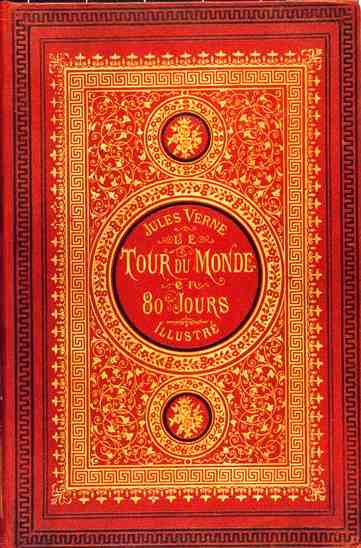
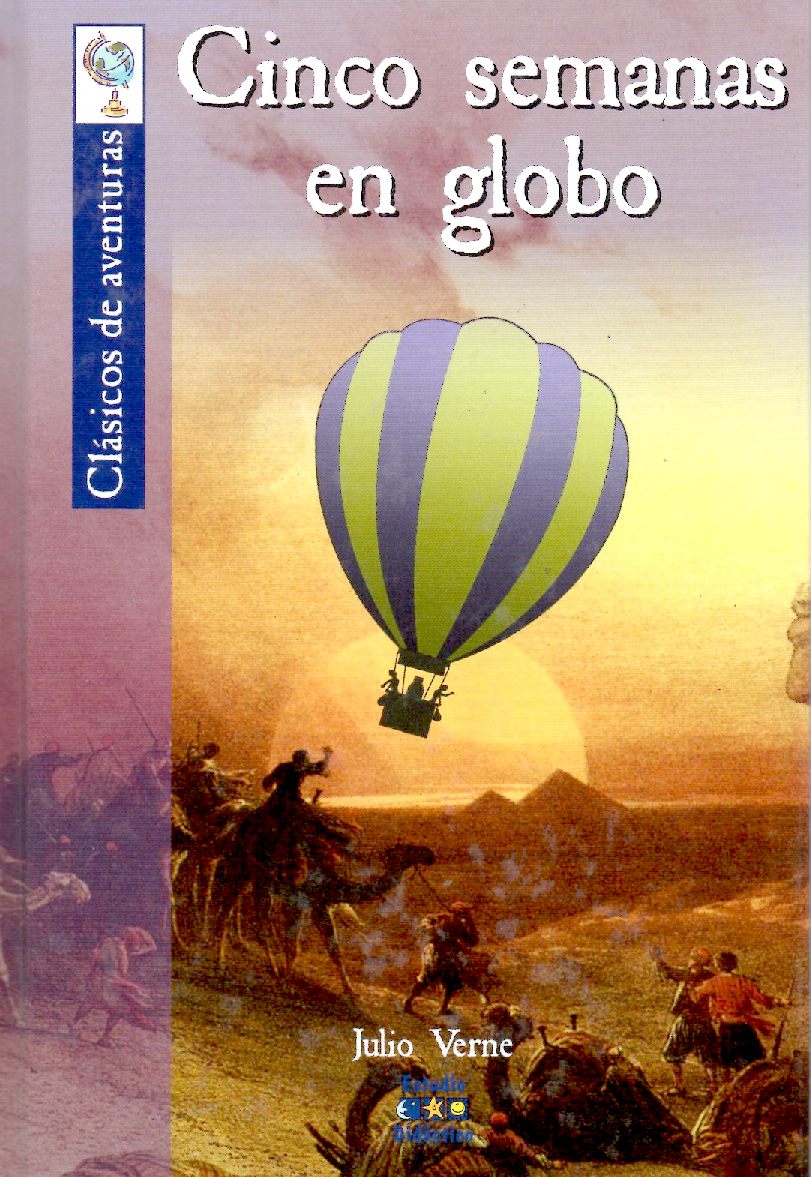
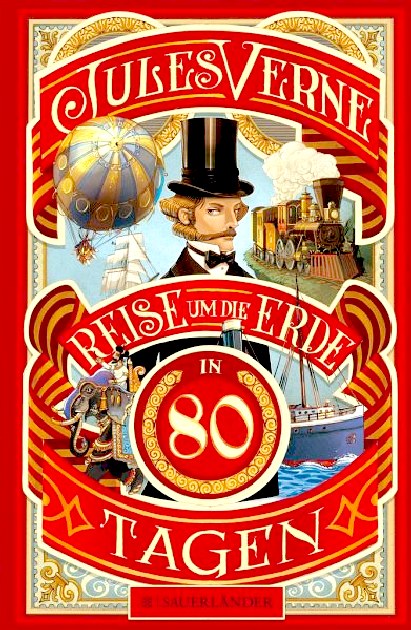
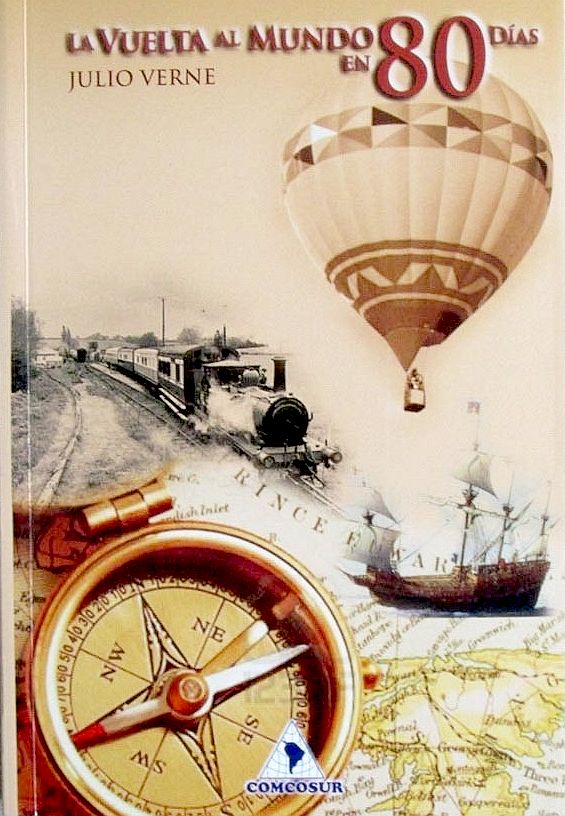
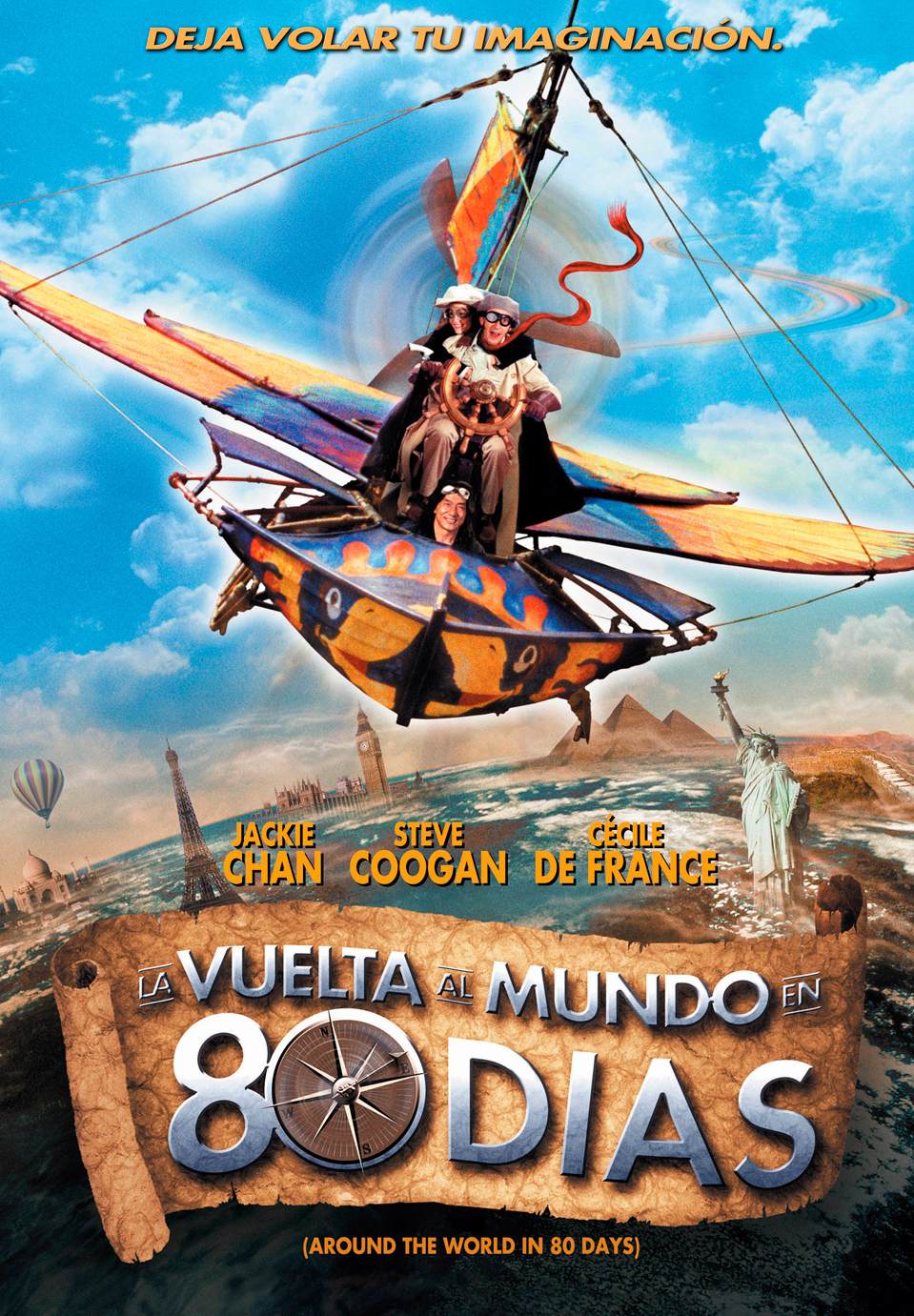
Many
of his stories today seem a little tame, as technology has caught up
with the imagination of the extraordinary French author, and Hollywood
has discovered Computer Generated Images (CGI) allowing super heroes to
grace our screens as never before. Computers are one thing that Verne
did not imagine or seek to portray.
Beginning in late 1872, the serialized version of Verne's famed Around the World in Eighty Days (Le Tour du monde en quatre-vingts jours) first appeared in print. The story of Phileas Fogg and Jean Passepartout takes readers on an adventurous global tour at a time when travel was becoming easier and alluring. In the century plus since its original debut, the work has been adapted for the theater, radio, television and film, including the classic 1956 version starring David
Niven. The TV series starring Pierce Brosnan released in 1989, runs for around 6 hours on
2 DVDs. A BBC
TV travel documentary starring Michael Palin, was also screened in
1989. A second TV series starring David Tennant was produced by the
BBC for 2021.
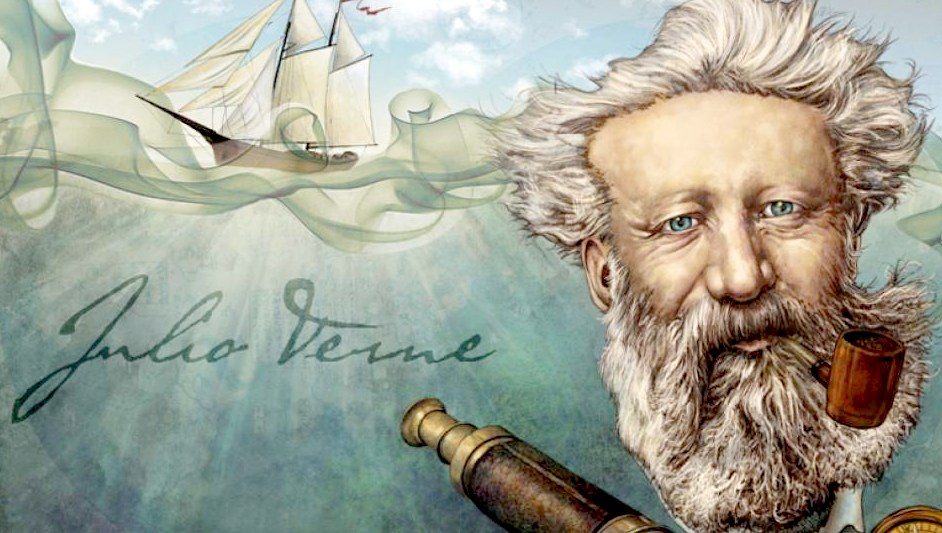
Jules
Verne is known as the Father of Science Fiction
Where
Jules Verne's suggested that it might be possible to travel
Around The
World In 80 Days, we would like to extend that ethos to include
traveling in a Zero
Emission yacht (ZEWT or ZEV) driven by electric
hydro-jets? With the advent of solar power, liquid hydrogen, methanol
reformers, and fuel
cells - we'll wager that it is a distinct possibility - on a scale of the
stake that the legendary Philleas Fogg entered into at the Reform Club in
1872. Now there's a challenge for you. Place your bets!
|







